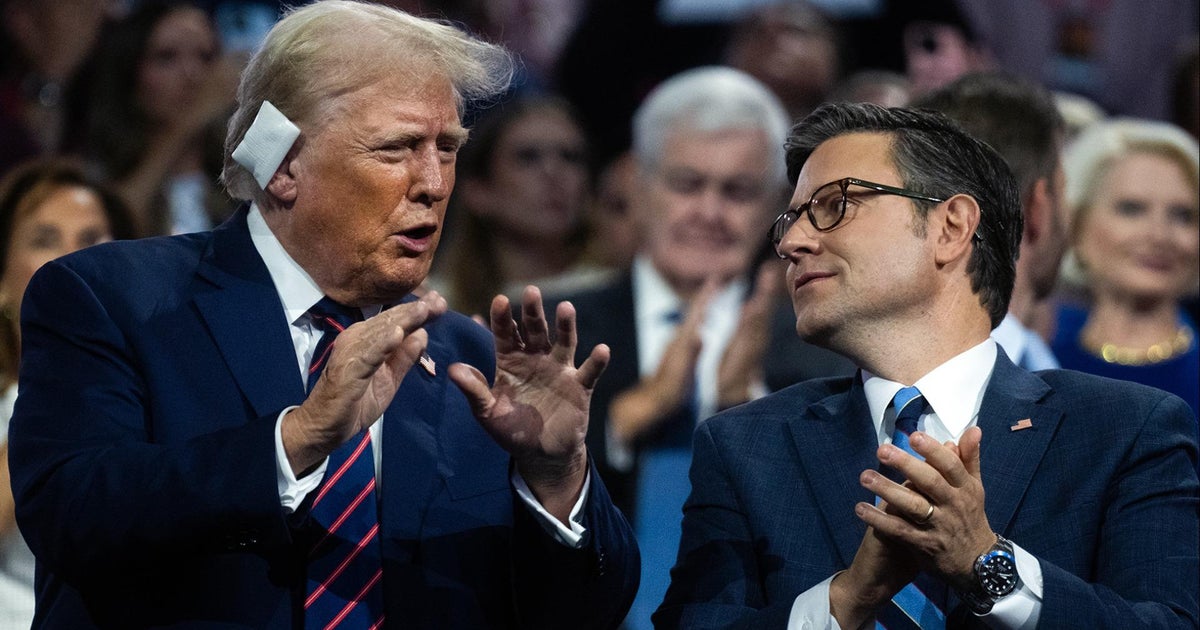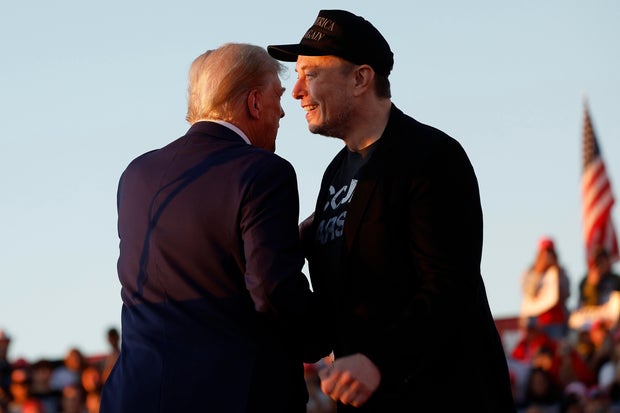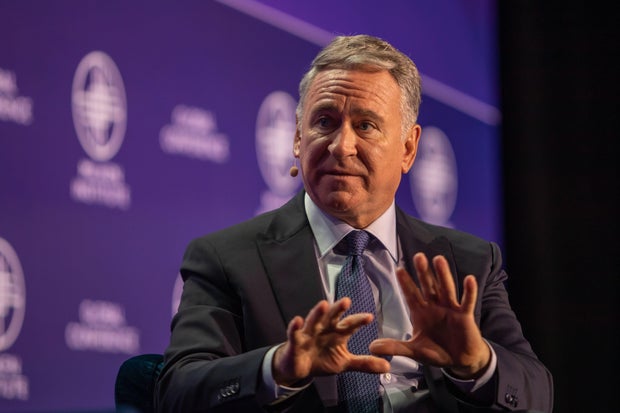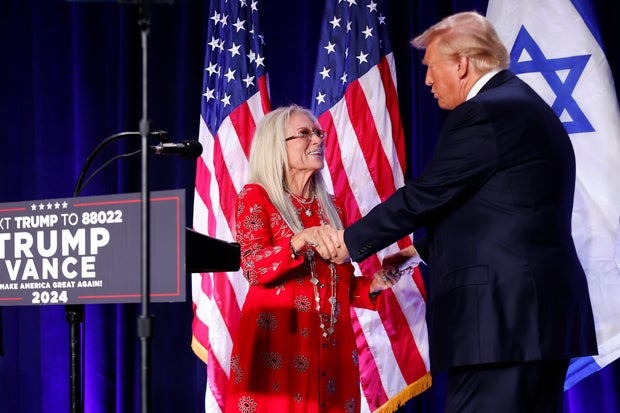CBS News
The megadonors who fueled Trump’s election and what they may want from his second term

More than $20 billion flooded into the 2024 presidential campaign, shattering the record for political spending in a single election. In an accelerating trend in American politics, Donald Trump, Kamala Harris and their allies raised colossal sums of money from billionaires.
A majority of these megadonors were Republicans, according to Open Secrets, the nonpartisan watchdog organization that tracks the influence of money on politics. And with Trump’s decisive victory, they hit the jackpot.
So, who are these high rollers and what do they want in return for their generosity?
Often, megadonors get lumped together in a single basket as plutocrats whose largesse is mostly about increasing their wealth with government contracts, tax breaks and regulatory relief, corrupting the democratic process along the way, according to critics of the U.S.’ campaign finance system. There’s certainly truth to that, but the story is more complicated.
The super wealthy titans of tech and industry don’t always share the same motivations and goals. Some are single-minded about bankrolling candidates as a way to bolster their bottom lines. But others are more ideologically driven, passionate about pet policies or reforming the way the government operates. Still others are driven by the scale of their ambitions or they crave the contact high of proximity to power.
In some ways political giving defies neat categories, and some megadonors may have overlapping interests. Some donors’ primary motivation may be an ideological commitment to unleashing the power of free markets, but that may also benefit their personal business interests.
Others may be more transactional, fending off government investigations into their businesses or securing lucrative contracts, although that might coincide with their political beliefs.
“Megadonors can have a variety of financial, ideological or personal motivations for pouring millions into politics,” said Brendan Fischer, deputy executive director of Undocumented, an investigative watchdog group. “These motivations can operate on a spectrum or as a Venn diagram.”
But either way, with so much money flooding into American politics, it is helpful to be aware of the agendas and interests behind the torrent or cash gushing into the system. What follows is a taxonomy of the Republican donor class in the wake of a momentous election that has many wondering where the country is headed and who stands to benefit from the money that is driving the change.
The Oligarch
One dictionary definition of an oligarch is a “very wealthy business leader who helps to run the government.” That would seem to fit Elon Musk, the world’s richest man, who personally gave more than $130 million (and his super PAC gave $200 million) to help Trump win back the White House. Musk has wasted no time taking advantage of his election dividend.
He’s been weighing in on key staffing decisions, has been named to head up (along with Vivek Ramaswamy) a commission on government efficiency and, according to Axios, even joined a call that Trump had with Ukrainian President Volodymyr Zelensky last week. Musk also traveled with Trump to Washington Wednesday for meetings with President Biden and with congressional Republicans.
Anna Moneymaker / Getty Images
Musk stands to benefit financially from that clout he has with the incoming administration. His companies are mammoth players across some of the most powerful sectors of the economy, from electric vehicles to rocketry and space exploration, from satellite-powered internet technology to artificial intelligence. According to the New York Times, Musk has at least 100 different contracts with the federal government with 17 different agencies. His SpaceX rocket company already has tens of billions of dollars in government contracts and stands to gain billions more during a Trump presidency.
And Musk has carefully cultivated key government regulators who could bring him a financial windfall after Trump takes office. One, according to Politico, is FCC Commissioner Brendan Carr, who Trump is expected to name as the agency’s chairman. Carr has been critical of his fellow commissioners for cutting Musk’s Starlink satellite company out of the Biden administration’s rural broadband program, denying him hundreds of millions or even potentially billions in subsidies.
Meanwhile look for Musk to influence SEC and other regulatory appointments that could stop investigations into his businesses. But what makes Musk unique is that his influence far transcends U.S. policies that could benefit his own businesses. Musk, through his global business empire, has the power to affect geopolitics on a scale perhaps greater than any person outside of government in history.
His personal wealth, estimated at $314 billion dollars (it jumped about $70 billion since Trump was elected), is greater than the GDP of multiple countries combined and the defense budgets of many industrialized Western countries. Musk’s Starlink owns at least half of the satellites currently in orbit. Through Starlink, Musk has the power to alter the course of wars, since the communications constellation he controls is often the primary way governments can get internet access in combat zones. His ambitions seem boundless — he even hopes to be at the forefront of colonizing space.
And none of that even takes into account his ownership of X, the social media platform he bought for $44 billion in 2022 and positioned as a MAGA megaphone to help Trump.
“All oligarchs have wealth power at their disposal, but not all are positioned in the same way,” said Jeffrey Winters, a professor at Northwestern who is an expert on oligarchs. “Some sell candy bars everyone eats. Others are engaged in space, high tech, own major media or have defense contracts. This takes their power to another level.”
The Pragmatist
These are the megadonors who are laser-focused on influencing policy and legislation on behalf of their business interests. They may be hard-edged conservatives, but they are pragmatic about how their political giving can help their bottom line and the American economy. A quintessential example would be Ken Griffin, the billionaire founder of the Citadel hedge fund, who gave $100,000,000 in the 2024 cycle, putting him at No. 5 on the list of top contributors, according to Open Secrets.
Apu Gomes / Getty Images
A self-described “Reagan Republican,” Griffin has long given to more establishment-oriented Super PACs like the Senate Leadership Fund and its counterpart in the lower chamber, the Congressional Leadership Fund. He has given far less to MAGA-oriented candidates, including Trump. Nor has he given money to political causes closely associated with Trump’s America First agenda. Instead, he has been tactical in his giving, focusing often on Republican candidates in down-ballot races who have business experience or are military veterans and can give Congress a more business-oriented complexion.
“Griffin is more of an establishment Republican more aligned with the traditional goals of the party, rather than the Trumpy wing,” says Anna Massoglia, a campaign finance expert.
Griffin said in a statement to CBS News, “I’m grateful for our country and to those who’ve built, served, and defended it. Going forward, we all share a duty to further strengthen our nation and improve the lives of our fellow citizens. As such, I support solution-oriented leaders who share my commitment to individual rights and freedom, economic policies encouraging prosperity and upward mobility, access to high-quality education for all children and young adults, safe communities, and a strong national defense.”
A more cutting-edge example of the pragmatists are donors who back the crypto-currency industry. Crypto Super PACs such as Fairshake and Defend American Jobs have been determined in their contributions to help elect pro-crypto candidates.
Defend America Jobs poured in $40 million to help elect Bernie Moreno, the crypto-friendly candidate who defeated long-time Democratic incumbent Sherrod Brown in the Ohio Senate race. Among those boosters of crypto and other digital currencies who gave heavily during the 2024 cycle were Marc Andreessen and Ben Horowitz, whose venture capital firm Andreessen Horowitz ponied up $45.2 million to pro-crypto super PACs. CBS News was not able to reach Andreesen Horowitz for comment.
Winklevoss Capital Management, the firm run by twin brothers Cameron and Tyler Winklevoss, chipped in another $5 million. “The crypto army is striking!” Tyler Winklevoss posted on X on Election NIght, hailing Brown’s defeat. But bucking the trend toward purely partisan contributions, the crypto industry gives to Republicans and Democrats alike, so long as they commit to keeping their industry unshackled by government regulations.
The Ideologue
These megadonors are more driven by personal causes that are not directly tied to their business interests. A representative example is Miriam Adelson, who along with her now-deceased husband Sheldon Adelson has been a casino magnate and major supporter of Jewish and Israel causes. In 2024, Miriam Adelson contributed more than $132 million to help Trump’s election effort. Adelson knows that her largesse drives results.
Chip Somodevilla / Getty Images
After the Adelsons donated tens of millions of dollars to help Trump win the White House in 2016, the new president announced the U.S. government would recognize Jerusalem as Israel’s capital and said he would move the American embassy from Tel Aviv to Jerusalem. The Adelsons even offered to pay for the construction of the new embassy. Miriam Adelson has not responded to a request for comment.
“These are passion projects, not attempts to feather the nest,” says one Republican who knows Adelson but asked not to be named in discussing her donations.
Another high-profile example of ideological givers are the billionaire shipping supply magnates Richard and Elizabeth Uihlein. The Wisconsin-based manufacturers of cardboard boxes and other packaging supplies, the Uihleins’ business skyrocketed in sales in 2020 when the COVID-19 pandemic ignited an e-commerce boom. The Uihleins did not respond to a request for comment.
During the 2024 campaign cycle, they were among the top five political donors, contributing more than $133 million to conservative causes. While much of their money went to Trump’s election, they also gave generously to other MAGA-allied causes. They’ve given to so-called election integrity groups that questioned the results of the 2020 election, as well as organizations like Moms for Liberty, which advocates against public school curricula that mention LGBTQ rights or critical race theory and supports book bans.
The Enigma
Some megadonors are so discreet about their political giving that it is hard to know what category they belong in. One example is Tim Mellon, the reclusive railroad magnate and heir to the Gilded Age Mellon fortune who happens to have given more money to Trump’s election (at least $197 million) than any other donor.
Mellon doesn’t go on cable TV or hobnob with politicos at party conventions, but he has written a memoir and penned some opinion pieces that offer some clues. Early in his adult life, he held liberal views on race, the problem of income equality and the environment. But as Mellon’s business career evolved, he developed a strong antipathy for what he viewed as intrusive government regulations on business, which seems to have strongly shaped his political views.
One defining episode for Mellon occurred after he bought an airport in Connecticut in the late 1990s. He cut down 340 trees, arguing that they posed a danger to pilots landing their planes. But state environmental regulators ultimately sued him and won. He was ordered to pay tens of thousands of dollars in damages. Did that experience fuel his desire to influence politics with his vast fortune? Perhaps, but it is also the case that Mellon has contributed to causes that would seem to have little to do with his particular business interests.
In the 2024 cycle he also gave $25 million to support Robert F. Kennedy Jr.’s presidential run. Some speculated that Mellon was trying to be a spoiler to help Trump, whom he was also backing financially. But last August, he wrote an article in the American Spectator explaining his support for Kennedy. Mellon, it turns out, is a COVID-19 vaccine skeptic. “I could not fathom how a ‘vaccine’ could be foisted on the general public with so little (if any) adequate testing.”
He began giving to Kennedy’s Children’s Health Defense, which promotes false information about vaccines — and later to the Super PAC supporting Kennedy. None of that would seem to help Mellon’s personal business interests. Mellon did not respond to a request for comment.
CBS News
Future of government spending deal unclear after Trump opposition

Watch CBS News
Be the first to know
Get browser notifications for breaking news, live events, and exclusive reporting.
CBS News
Stock market plummets after Fed forecasts fewer rate cuts in 2025

U.S. stocks plummeted in one of their worst days of the year after the Federal Reserve forecast Wednesday it may deliver fewer shots of adrenaline for the economy in 2025 than it had earlier projected.
The S&P 500 fell 178 points, or 3%, pulling it further from its all-time high set a couple weeks ago. The Dow Jones Industrial Average lost 1,123 points, or 2.6%, while the Nasdaq composite dropped 3.6%.
The Fed said Wednesday it’s cutting its benchmark interest rate for a third time this year, continuing the sharp turnaround begun in September when it started lowering rates from a two-decade high to support the job market. Wall Street loves lower interest rates, but the Dec. 18 cut had been widely expected by Wall Street.
Why is the stock market down today?
Investors were unsettled by the Fed’s forecast for fewer cuts in 2025, even though many economists had already been paring their expectations given sticky inflation.
“Markets have a really bad of habit of overreacting to Fed policy moves,” Jamie Cox, managing partner for Harris Financial Group, said in an analyst note. “The Fed didn’t do or say anything that deviated from what the market expected—this seems more like, I’m leaving for Christmas break, so I’ll sell and start up next year.”
The bigger question centers on how much more the Fed could cut next year. A lot is riding on it, particularly after expectations for a series of cuts in 2025 helped the U.S. stock market set an all-time high 57 times so far in 2024.
Fed officials released projections on Wednesday showing the median expectation among them is for two more cuts to the federal funds rate in 2025, or half a percentage point’s worth. That’s down from the four cuts they had expected just three months ago.
“We are in a new phase of the process,” Fed Chair Jerome Powell said. The central bank has already quickly eased its main interest rate by a full percentage point, to a range of 4.25% to 4.50%, since September.
What happened to the stock market today?
Asked why Fed officials are looking to slow their pace of cuts, Powell pointed to how the job market looks to be performing well overall and how recent inflation readings have picked up. He also cited uncertainties that will require policy makers to react to upcoming, to-be-determined changes in the economy.
While lower rates can goose the economy by making it cheaper to borrow and boosting prices for investments, they can also offer more fuel for inflation.
Powell said some Fed officials, but not all, are also already trying to incorporate uncertainties inherent in a new administration coming into the White House. Worries are rising on Wall Street that President-elect Donald Trump’s preference for tariffs and other policies could further juice inflation, along with economic growth.
“When the path is uncertain, you go a little slower,” Powell said. It’s “not unlike driving on a foggy night or walking into a dark room full of furniture. You just slow down.”
One official, Cleveland Fed President Beth Hammack, thought the central bank should not have even cut rates this time around. She was the lone vote against Wednesday’s rate cut.
Wall Street’s worst performers
The reduced expectations for 2025 rate cuts sent Treasury yields rising in the bond market, squeezing the stock market.
The yield on the 10-year Treasury rose to 4.51% from 4.40% late Tuesday, which is a notable move for the bond market. The two-year yield, which more closely tracks expectations for Fed action, climbed to 4.35% from 4.25%.
On Wall Street, stocks of companies that can feel the most pressure from higher interest rates fell to some of the worst losses.
Stocks of smaller companies did particularly poorly, for example. Many need to borrow to fuel their growth, meaning they can feel more pain when having to pay higher interest rates for loans. The Russell 2000 index of small-cap stocks tumbled 4.4%.
Elsewhere on Wall Street, General Mills dropped 3.1% despite reporting a stronger profit for the latest quarter than expected. The maker of Progresso soups and Cheerios said it will increase its investments in brands to help them grow, which pushed it to cut its forecast for profit this fiscal year.
Nvidia, the superstar stock responsible for a chunk of Wall Street’s rally to records in recent years, fell 1.1% to extend its weekslong funk. It has dropped more than 13% from its record set last month and fallen in nine of the last 10 days as its big momentum slows.
“As we wrote in our 2025 outlook a couple of weeks ago, stretched positioning and sentiment left stocks vulnerable to a sell-off,” Jeff Buchbinder, chief equity strategist for LPL Financial said in a note about today’s market sell-off. “The big jump in inflation expectations and related bond sell-off was a convenient excuse. Once support from tech evaporated, no other groups were able to step in to fill that gaping hole.”
CBS News
Trump comes out against Johnson bill that would avert shutdown

Watch CBS News
Be the first to know
Get browser notifications for breaking news, live events, and exclusive reporting.








